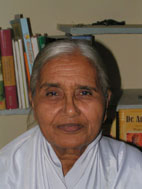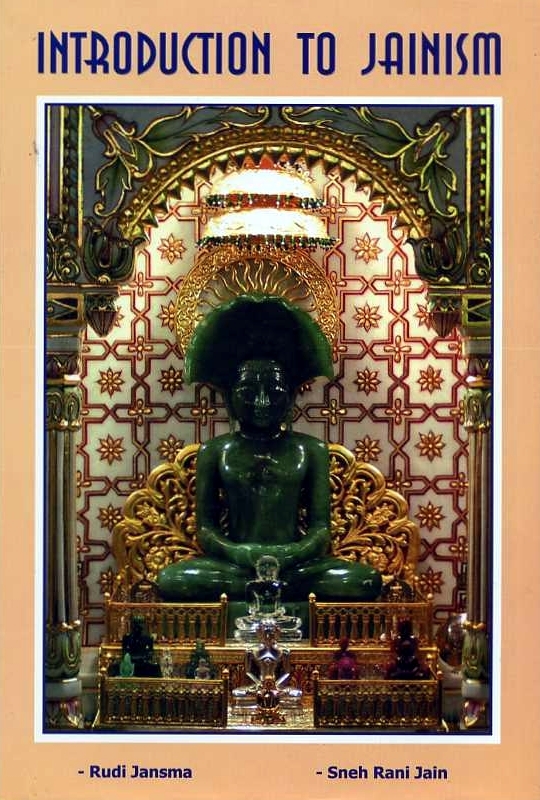At once one realizes the brotherhood of all beings, that all beings have a soul with the highest innate qualities, and that every living being has the innate possibility to reach its spiritual summit. This awareness of brotherhood brings forth strong feelings of compassion (anukampā) for all beings. Brotherhood and compassion, as well as disinterest concerning worldly desires and attachments are therefore described as the character qualities of a man or woman who has experienced this first spark of enlightenment. As P.S. Jaini writes in his The Jaina Path Of Purification:[80] “Whereas the compassion felt by an ordinary man is tinged with pity or with attachment to its object, anukampā is free of such negative aspects; it develops purely from wisdom... and it fills the individual with an unselfish desire to help other souls towards moksha.”
The spark of enlightenment has also opened the mind in such a way that one can effectively reflect on such universal questions as all human beings have, but which cannot be solved by the brain mind and a materialistic approach alone, such as “what is death?”; “what is the purpose of life?”; “what are the laws which govern life and the universe?”; “what is the inner structure of the universe and of man, composed of living forces and of intelligent beings?” A man who has caught this glimpse of the nature of the soul, or even if he has only seriously taken notice of the possibility, will never again entirely stumble into the pitfalls of materialistic nihilism or of dogmatism - the two spooks which haunt our western sciences and many religions.
P.S. Jaini makes a most interesting statement when he writes about compassion, which “develops purely from wisdom” and “fills the individual with an unselfish desire to help other souls towards moksha.” “If this urge to bring all tormented beings out of samsāra is particularly strong and is cultivated, it may generate those auspicious karmas that later confer the status of Tīrthamkara upon certain omniscients. When present to a more moderate degree, anukampā [compassion] brings an end to exploitive and destructive behavior, for even the lowest animal is now seen as intrinsically worthwhile and thus inviolable” (p.150). The above statement shows that Jainism does not only teach the path towards self-realization and detachment as the final aim. It allows the possibility, urged by great compassion, to postpone one’s own liberation and turn one’s face towards all sentient beings which are struggling their way upward towards final accomplishment, and stretch out a helping hand by reviving the knowledge of eternal truth.
Perhaps not all Jains have been sufficiently aware of this idea. It would however, in my opinion, seem strange if the core teaching of compassion and utter detachment from selfishness were to suddenly appear unreal and be abandoned when the universal insight is acquired. No doubt the highest compassion and unselfishness would compel the soul on the threshold of liberation to turn back for the sake of all beings, rather than spend eternity in lofty bliss and omniscience, but only for oneself. This would bring the Jain teaching very close to the Buddhist and theosophical distinction between pratyeka Buddhas - Buddhas for themselves alone - and Buddhas of Compassion, who accomplish all that can be accomplished by a human being and abandon the reward of a very long period of bliss and peace to help the world. However only 48 souls will function as Tīrthamkaras in the world’s great cycle of pleasure and pain in which all human development takes place, whereas Buddhism and theosophy teach that everyone can make the choice to postpone his blissful reward over and over again when inspirited by compassion for all beings that still suffer from the illusions in which they are caught.
The higher stages describe the processes of overcoming and eliminating all restrictions, and the actions that must be undertaken to perform this. Depending on one’s situation in society and one’s determination, the Jain may choose the path of the layman or laywoman first, or at once the more strenuous path of the mendicant. The conditions for both are described in the fifth and seventh stages.
Now that one has really chosen to approach Truth and to take away every obstruction that hinders the full shining forth of what one is in one’s essence, one needs to actively cultivate ethics in the purest form possible. A great help in keeping one’s determination alive even during difficult times, is to take vows, before a teacher and before one’s inner self. The naked monks we met had all made such vows. The serious pilgrim towards truth is very much aware of the courage it takes to make such a vow, and of the consequences of failure to keep it.
The core of all Jain ethics is ahimsā, non-violence, the avoidance of giving injury, physically, mentally, or in words. This includes one’s own actions as well as one’s responsibility for or support for violent actions by others. The main difference between the lay and mendicant paths is the strictness with which ahimsā is practiced. Every Jain will always avoid killing, or being indirectly responsible for killing, the forms in which souls are incarnated, whether human or animal, and as much as possible even plant and mineral lives. Of course they disagree with animal sacrifices such as practiced by certain religious groups, or misuse of animals in scientific laboratories. If modern science had grown up within a Jain culture, no research would ever have taken place which does harm to animals or any other living being, and they would have studied life directly, instead of analyzing corpses from which the conscious essence has flown. Indeed the world would have looked entirely different, without slaughter, without wars, without man-induced extinction of species, and without any form of environmental degradation. The Jains prove that such a way of life is possible.
The most important lay vows are called anuvrata - “atom vows”:
- non-violence;
- truth, not lying, however subtly, under any condition, which involves great care in speaking at all times, and perhaps not speaking when this could result in harm to any creature;
- non-stealing, or not taking anything that is not given;
- no sexual misconduct, i.e. sex outside marriage, and excessive indulgence in sexual pleasures with one’s partner;
- non-possession and non-attachment. Possessions, then, are material objects as well as internal possessions, passions, sentiments, or attachments in general.
The sixth stage[81] is that of the mendicant. The principle of nonviolence is carried out to the fullest possible extent, and includes the tiniest and most primitive life-forms, even the elements: the mendicant must not dig the earth, walk on grass, or extinguish a fire, etc. Thus he develops an attitude of absolute harmlessness towards living beings and the natural environment, and takes only what is given without asking. He has become a perfect friend of all beings and a perfect environmentalist. To continue his quest he will do everything to better the qualities of his character, and reflect mentally on the various aspects of universal philosophy. This is formulated by Jain ethics and philosophy respectively in the form of ten dharmas or observances, and twelve mental reflections or meditations.[82] The ten dharmas are, as summarized in the Tattvārthadhigama Sūtra (IX, 6):
- perfect forgiveness,
- humility,
- honesty,
- purity,
- truthfulness,
- self-restraint,
- austerity,
- renunciation,
- non-attachment and
- chastity.
The meditations or mental reflections are of a philosophical nature, and lead to insight in the nature of the universe and its basic laws, and of life, the human condition, and the path of spiritual evolution and liberation from suffering and ignorance. Suggestive subjects to reflect on, as given in the Tattvārthadhigama Sūtra (IX 7:) are, among others: everything is subject to change and therefore transitory; there is no point trying to avoid what is inevitable, because the seeds sown in the past must come to fruition according to their natural character; the soul moves through endless cycles of embodiment and true happiness can only be obtained by release from this cyclicity; I am alone the doer of my actions and the enjoyer or sufferer of the fruits of them; the inflow of karmas, the result of passions etc., is the cause of my mundane existence; the inflow can be stopped; it is possible to purify the soul of its obstructing and deluding karmas, through conscious effort and the practice of ethics; the universe (contrary to contemporary western ideas about a big bang and possible big crunch) has no absolute beginning or end, was never created and operates according to its own laws without divine intervention; the sacred teachings are absolutely true, the core of all ethics is ahimsā, and the path leads to the ultimate goal of eternal peace and omniscience.
All these observances and reflections are meant to lead to complete renunciation of all forms of egotistic thinking. These are the meditations practiced by the ascetic monks referred to in the previous chapter. A mendicant, while taking vows, first rises to the 7th stage, then regresses to the 6th. The seventh stage[83] is when one cultivates the higher meditations. The meditations and awakening of states of higher awareness bring the aspirant ever closer to his goal, but many of the remaining karmas still have to be suppressed and indeed eliminated. The higher meditations and processes are too esoteric to be described in words. It would make little sense it seems, to try to explain subtleties that grosser minds can not possibly grasp.
In the eighth, ninth, tenth and eleventh stages the so-called conduct-deluding karmas, such as anger, pride, deceit, greed, grief, fear, sexuality and certain others are either suppressed or destroyed, including the most subtle ones. One can imagine that, as one progresses on the path, one has to face every single delusion and weakness to which one has succumbed in past lives, and every single one has to be conquered. It must indeed be a dreadful experience to come face to face with all harm one has ever done to the world through time. And what if, driven by Compassion, we wish to destroy all that causes evil in the world, and thus evoke all this as enemies against us in the form of the most dreadful monstrosities? Everything must be conquered – and we have the power, as long as we do not forget that the ultimate purity, wisdom and force for the good of all beings is innate in the soul. Up to the eleventh stage one climbs one of two “ladders”: the one of suppression or the one of elimination. As long as the karmas are only suppressed the aspirant will reach the eleventh stage, but the passions will resurface and may draw him back to a lower stage. But eventually he will have enough energy to eliminate the karmas and pass beyond the eleventh stage and enter the twelfth, the stage of Arhat, avoiding the dangers of the 11th stage.
The last conduct-deluding, knowledge- and perception-obscuring and energy-restricting karmas are now eliminated and the obstructions to endless bliss and energy are no more. The aspirant reaches the thirteenth stage spontaneously: he possesses omniscience[84] during incarnation, either as a Tīrthamkara or as a kevalis (omniscient one).
The fourteenth and final stage is the stage reached by an Arhat just before leaving his physical vehicle. All vibrations of the soul that attract karmas and cause bondage have now ceased. After having left the physical body for the last time, he enters moksha, the disembodied state of eternal bliss and omniscience.
Some, very rarely – in harmony with the law of cycles, and in consequence of their karma - remain as omniscient and liberated teachers for the good of humankind and all living beings. This karma is above all that of universal compassion, and charity towards all who strive upward. They are the Tīrthamkaras.
 Dr. Sneh Rani Jain
Dr. Sneh Rani Jain
 Publisher:
Publisher: